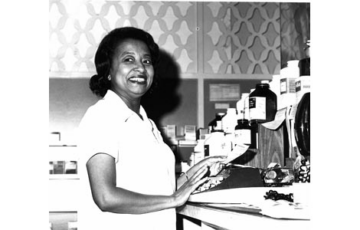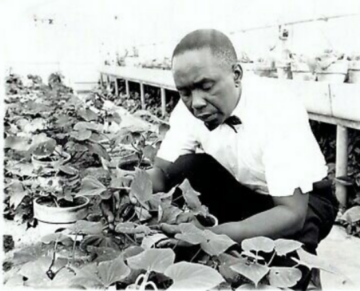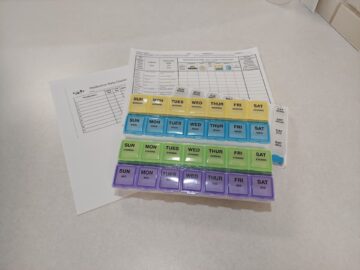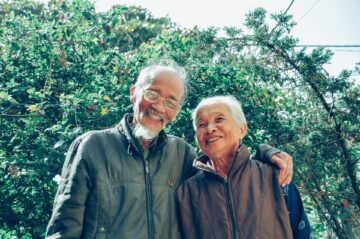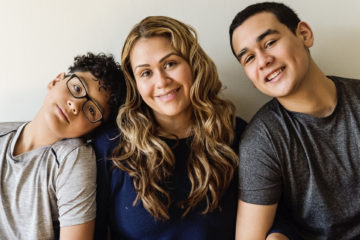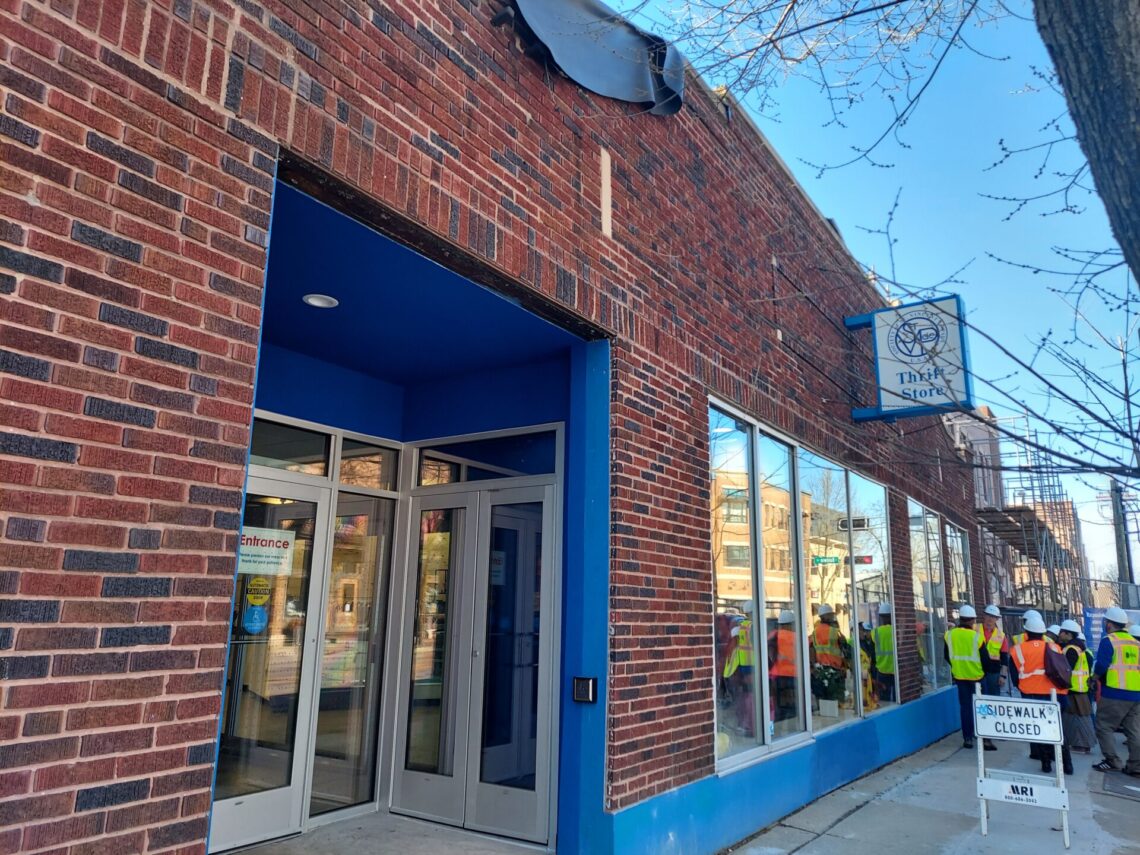The Society of St. Vincent de Paul — Madison is dedicated to helping our neighbors in need, and the establishment of La Conferencia Divina Misericordia (Divine Mercy Conference), the first Spanish-speaking conference in the Diocese of Madison, stands as a testament to this commitment. The conference, born out of a growing need for Spanish-speaking support, has quickly become a beacon of hope and assistance for many families in Dane County.
Conference Vice President, Leticia Rodríguez, was initially hesitant about committing to such a significant responsibility. However, with the encouragement of fellow Vincentian Alejandro Vergara and the shared vision of providing assistance to those in need, she embarked on this rewarding journey.
One of the core motivations for Leticia and other members is the opportunity to help others. For them, assistance is not just a material gift but a spiritual one, a way to connect with their faith and with those they help. Their home visits, now totaling about eleven each week, have become a cornerstone of their mission. They offer both material aid and spiritual encouragement (if desired) to each neighbor they visit.
Prayer is at the heart of their efforts. Prayer for discernment of how to assist, prayer for perseverance, prayer for a growing relationship with Christ and prayer that others will be inspired to join the mission. Members have received practical assistance, encouragement and spiritual guidance from their local pastors and Bishop Hying. Knowing that their priests are praying for them and for their mission gives them hope, Leticia said.
“La Conferencia Divina Misericordia, like all Society of St. Vincent de Paul Conferences, is important because it deepens members’ faith by encountering God in others and within themselves,” Gayle Westfahl, Membership Director, said. “Through friendship, service and prayer, members deepen their relationship with God. They open themselves up to experience the goodness of God within others and within themselves.”
The future of La Conferencia Divina Misericordia is bright! Leticia hopes to welcome more members into the conference, especially this month as the Catholic Church celebrates Divine Mercy Sunday – the conference’s namesake. Along with her fellow Vincentians, she strives to pass on the values of compassion and service to future generations.
“One day this conference will belong to our children,” Leticia continued. “We want to show them the value and goodness of helping others.”
The establishment of La Conferencia Divina Misericordia is not just a milestone for the Society of St. Vincent de Paul but also for the Spanish- speaking community in Dane County. It is a testament to the power of faith, compassion, and community in making a difference in the lives of those in need.
Want to grow in your faith through service and fellowship? Any Spanish-speaking adult in Dane County is welcome to join La Conferencia Divina Misericordia. Learn more here: /member-conferences/.
La Sociedad de San Vicente de Paul — Madison está dedicada a ayudar a nuestros vecinos en necesidad, y el establecimiento de La Conferencia Divina Misericordia, la primera conferencia en español de la Diócesis de Madison, permanece como un testamento a este cometido. La conferencia, creada por la necesidad del soporte de habla hispana, ha crecido rápidamente como un faro de esperanza y asistencia para muchas familias en el condado de Dane.
La Presidenta de la Conferencia, Leticia Rodríguez, en un principio dudaba en comprometerse a esta responsabilidad tan importante. Sin embargo con el ánimo del compañero Vicenciano Alejandro Vergara y al compartirle la visión de ayudar a los más necesitados, ella se embarcó en este viaje sumamente gratificante.
Uno de los centros de motivación de Leticia y otros miembros es la oportunidad de ayudar a otros. Para ellos, asistencia no es solo un regalo material sino también espiritual, una manera para conectarse con su fe y con los que ayuda. Las visitas en casa, con once cada semana, han llegado a ser la piedra angular en su misión. Ellos ofrecen ayuda material y anímico espiritual (si así lo desean) a cada vecino que visitan.
El rezo es el corazón del esfuerzo. El rezo es el discernimiento en cómo ayudar, el rezo para la perseverancia, el rezo para crecer los brazos de amistad con Cristo y el rezo para que otros se sientan inspirados para unirse a la misión. Los miembros han recibido asistencia práctica, ánimo espiritual de parte de sus pastores locales y el Obispo Hying. Con esto en mente, sabiendo que los sacerdotes están rezando por ellos y por su misión les da ánimo, dijo Leticia.
“La Conferencia Divina Misericordia, al igual que todas las sociedades de conferencias de San Vicente de Paul son importantes por que dependen de la fe de sus miembros encontrándose con Dios en otros y entre ellos mismos,” Gayle Westfahl, Directora de membresías, dijo. “Por medio de la amistad, servicio y rezos, los miembros dependen de la relación con Dios. Ellos se abren a experimentar la bondad de Dios en otros y entre ellos mismos.”
El futuro de La Conferencia Divina Misericordia es brillante! Leticia espera darle la bienvenida a más miembros para las conferencias, especialmente este mes que la Iglesia Católica celebra el Domingo de La Divina Misericordia – el nombre a la conferencia. Junto con los compañeros Vicentinos, ella se esfuerza en compartir los valores de compasión y servicio a nuestras futuras generaciones.
“Un día esta conferencia pertenecera a nuestros hijos,” Leticia continuo. “Queremos enseñarles nuestros valores y la bondad que es ayudar a otros.”
El establecimiento de La Conferencia Divina Misericordia no es solamente una meta a la Sociedad de San Vicente de Paul pero también lo es para la comunidad de habla hispana del Condado de Dane. Es el testamento del poder de la fe, compasión y comunidad en hacer la diferencia en las vidas de los más necesitados.
¿Quiere hacer crecer su fe por el servicio y el compañerismo? Cualquier adulto hispano hablante en el Condado de Dane es bienvenido a unirse a La Conferencia Divina Misericordia. Aprenda mas aqui: /member-conferences/.
During February’s Black History Month, we celebrated the work and shared information on some significant Black historical figures. The people we highlighted this year were specifically chosen due to their connection with our Catholic heritage, Wisconsin/Dane County, our food pantry, pharmacy, or the people we serve. Here are this year’s featured people…
1. Sister Antona Ebo
Sister Antona Ebo was a Franciscan Sister of Mary and hospital administrator. She was one of six Catholic nuns who marched to Selma, Alabama in 1965 to protest discriminatory voting practices and highlight racial injustice. She became the first African American woman to head a Catholic hospital when she was named executive director of St. Clare’s Hospital in Baraboo, Wisconsin. In Madison, she was chaplain at St. Mary’s Hospital Medical Center and was involved in social projects with Madison Urban League, the Madison Housing Authority, the NAACP and other local organizations.
Read more: https://www.franciscanmedia.org/st-anthony-messenger/antona-ebo-fsm-brave-sister-of-selma/, https://www.newspapers.com/article/the-capital-times-madisons-losing-siste/68066298/
2. Rev. James C. Wright
Rev. James C. Wright was a Madison civil rights activist, minister, businessman, and public servant. His legacy includes serving as the first Executive Director for the Equal Opportunities Commission where victims of discrimination could receive restitution for the wrong done to them. He was a beloved minister for more than three decades at Mt. Zion Baptist Church and founding member of the Urban League of Greater Madison. Thank you Rev. Wright for your courage, commitment, and care for people struggling for equity.
3. Shirley Chisholm
Shirley Chisholm was an American politician and the first Black woman elected to Congress in 1968. She was the first Black candidate for a major political party for president when she ran for president in 1972. During her time in Congress, Shirley was involved in the House Agriculture Committee where she worked to protect and expand food assistance programs. She was instrumental in the creation of the Federal WIC (Women, Infants and Children) Program that safeguards low income households with women, infants and children up to the age of 5, by providing supplemental food, nutrition education, and referrals to healthcare. More than 90,000 women and young children are currently receiving WIC support in Wisconsin alone. We thank Shirley Chisholm’s commitment to help fight food insecurity!
Read more: https://foodforothers.org/honoring-black-history-month-5-african-american-anti-hunger-activists/
4. Mary Munson Runge
Mary Munson Runge was a pharmacist, advocate, mentor and leader. “In 1979, Runge was elected president of the American Pharmacists Association — the first woman and the first African American to be named to the role, ending a 126-year run of white, male presidents.” Runge was first a hospital pharmacist, then moved to community pharmacy where her personal passion to help people who could not pay for their medications flourished. Holding several federally-appointed roles, Runge advocated for the inclusion of women and minorities in pharmacy.
Read more: https://www.express-scripts.com/pharmacy/blog/celebrating-black-history-month-three-pharmacy-trailblazers-who-made-difference, https://www.aphafoundation.org/mary-munson-runge-scholarship, https://www.biomatrixsprx.com/news/mary-munson-runge-a-trailblazer-in-pharmacy
5. Ardie Clark Halyard
Although born to a family of sharecroppers in Georgia, Ardie Clark Halyard earned a university degree in 1920 – a year in which only 396 African Americans received bachelor’s degrees nationwide. Settling in Milwaukee with her husband Wilbur in 1923, they opened the Columbia Savings and Loan – the first African American-owned S&L. Columbia offered financial services that helped Black Milwaukeeans build security and stability through savings, business development and home ownership. Neither took a salary for the first 10 years of Columbia’s operation, and supported themselves through full-time jobs. Ardie’s efforts in social and economic justice extended to the Milwaukee chapter of the NAACP, where she served as the first woman president. Thank you for your sacrifice and lifetime of service so that all people may thrive.
Read more: https://womeninwisconsin.org/profile/ardie-clark-halyard/
6. Booker T. Whatley
Booker T. Whatley was a professor of agriculture at Tuskegee University who specialized in sustainable agriculture. He pioneered the practice of regenerative agriculture and taught farmers how to diversify their crops. He created several new plant varieties including five sweet potato varieties and 15 grape varieties. Whatley advocated for ideas thought to be ahead of his time. In the 1960s and 1970s, he developed a client membership garden club where customers paid a fee to receive a portion of the harvest. This program laid the foundation for what became the modern community supported agriculture (CSA) program. Mr. Whatley has not been widely credited for the modern CSA system, however; it is often miscredited to farms in the mid 1980’s. Thank you Booker T. Whatley for helping to cultivate new ideas in agriculture and sustainability! These practices directly contribute to food pantries like ours that rely on gardens like the Madison Area Food Pantry Gardens and the Lacy Garden for fresh produce during the growing season to provide fresh and healthy food for our neighbors.
Read more: https://foodforothers.org/honoring-black-history-month-5-african-american-anti-hunger-activists/
7. Anna Louise James
Anna Louise James was born in 1886, the daughter of a former slave. She graduated as the only woman in her class at the Brooklyn College of Pharmacy in 1908. Once obtaining her license, she became one of the first Black women to be a licensed pharmacist in the United States and was the first in the state of Connecticut. She began working at her brother-in-law’s drugstore and in 1917 it was renamed “James Pharmacy.” She operated the pharmacy until her retirement in 1967. During her career she was well known in her community for helping many people with their prescriptions when they were unable to pay the full amount. Thank you Anna Louise James for being a strong advocate for patient wellbeing and care!
Read more: https://www.pharmacytimes.com/view/celebrating-black-history-month-5-trailblazing-pharmacists, https://www.express-scripts.com/pharmacy/blog/celebrating-black-history-month-three-pharmacy-trailblazers-who-made-difference
8. Nellie Wilson
Nellie Wilson, a labor activist, was born in Texas and moved to Milwaukee with her father in 1928 when she was twelve years old. In the beginning of her working career, she faced discrimination through several low-paying jobs. During World War II, defense industry jobs opened to African Americans and Nellie secured a job at local manufacturing company, A.O. Smith. At A.O. Smith she became active in the workers’ labor union. She won election as a department steward, “founded the women’s committee of the Wisconsin chapter of the American Federation of Labor and Congress of Industrial Organizations (AFL-CIO),” and became the first woman elected to the union’s executive board. She fought against racial and gender discrimination at the company, filling many grievances on behalf of female workers. In retirement, Nellie continued to hold positions of leadership in AFL-CIO and advocated on behalf of women, minority and veteran workers. Thank you, Nellie, for your leadership and work in fighting for fair working opportunities!
Read more: https://www.milwaukeemag.com/women-make-milwaukee/, https://womeninwisconsin.org/profile/nellie-wilson/
On January 4th, the Catholic Church celebrates the feast day of St. Elizabeth Ann Seton. Who is she and how does her example inspire us today?
St. Elizabeth Ann Seton’s story is one of loss, grief, and struggle. It’s also a story of love, charitable service, and fervent devotion to Christ.
Born in New York City, she is the first United States-born canonized saint. Locally, her legacy lives on in the Society of St. Vincent de Paul — Madison’s St. Elizabeth Ann Seton Program.
A mother, widow, Catholic convert, and Daughter of Charity
Elizabeth Ann Bayley was born to an upper-class Episcopal family in 1774. Her first loss occurred at age three when her mother passed away. She read extensively and knew her Bible well. At 19, Elizabeth married wealthy businessman William Magee Seton and were blessed with five children. When the family business struggled and fell into bankruptcy after the loss of William’s father, she and the children went to live with her father. Elizabeth sold their remaining possessions to join William in Italy who was convalescing with advancing tuberculosis. He succumbed to the disease in 1803.
Amid the loss and grief of her husband’s death, Elizabeth became familiar with the Catholic Church drawn particularly by the Eucharist and surrendering to God’s will. She drew close to Our Lady and “felt great comfort in the idea that the Blessed Virgin was truly her mother.” She converted to Catholicism in 1805.
Upon her return to the United States, Elizabeth established several schools; including Saint Joseph’s Academy and Free School, the first free parochial school for girls in the United States dedicated to Catholic education. Elizabeth’s leadership of the school laid the foundation for the United States parochial school system.
In Maryland, Elizabeth co-founded the Sisters of Charity of St. Joseph, the first community for religious women established in the United States, professing her vows in 1809. Now Mother Seton, she continued her maternal duties to her children while carrying out her roles as a sister. In 1811, the Sisters of Charity adopted the rules of the Daughters of Charity; the congregation co-founded in France by St. Vincent de Paul and Louise de Marillac. During this time, Elizabeth lost two daughters to illness and guided the Sisters’ growth by establishing two orphanages and a second school. God called Mother Seton home to Him in 1821, at the age of 46.
St. Elizabeth Ann Seton is the patron saint of Catholic schools, educators/teachers, loss of parents, widows, orphans, and people rejected/persecuted for their faith.
Preventing family homelessness
The Society of St. Vincent de Paul — Madison shares a particular devotion to St. Elizabeth Ann Seton. In 1989, they honored her as a single mother, a Vincentian, and one dedicated to charitable service by establishing the St. Elizabeth Ann Seton House as transitional housing for single women and single mothers struggling with homelessness.
Its successor, the St. Elizabeth Ann Seton Program now provides individualized supportive services to single adult families who have recently moved from homelessness into permanent housing. Program staff accompany families to work on issues negatively impacting their well-being and help them create manageable goals that bring stability, prevent future homelessness, and help them thrive. Help is individualized to meet each family’s unique needs.
If you too have a heart for St. Elizabeth Ann Seton and her living legacy, visit: /program/seton-program/
St. Elizabeth Ann Seton, pray for us.
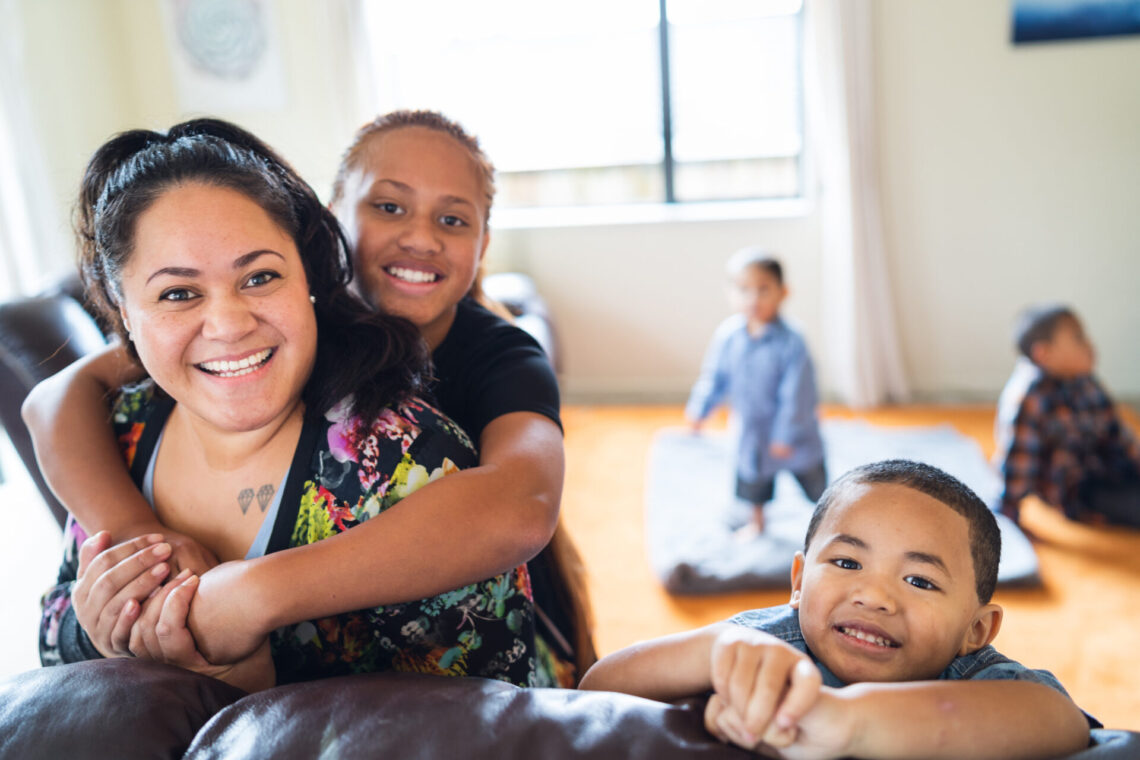
The St. Elizabeth Ann Seton Program provides individualized supportive services to single adult families who have recently moved from homelessness into permanent housing.
Sources: https://setonshrine.org/elizabeth-ann-seton/, https://www.catholic.org/saints/saint.php?saint_id=180, https://en.wikipedia.org/wiki/Elizabeth_Ann_Seton, https://en.wikipedia.org/wiki/Saint_Joseph_College_and_Mother_Seton_Shrine,
Dear friends,
As we take time to reflect on 2023, one word comes to mind; MIRACLE.
You are – and truly have been – a miracle to our neighbors in need. You have transformed scarcity into abundance.
You were there despite a 104% increase in families needing food, medicine, clothing, furniture, and support. In 2023, no one seeking help from the Society of St. Vincent de Paul — Madison was turned away. Thank you for your compassion for every one of these families.
You are part of a caring community of supporters who believe all people deserve dignity.
In fact, for the first time in her life, Angela has stability thanks to you.
For nearly four decades Angela has struggled with abuse, abandonment, gang violence, mental health issues, and homelessness. Sadly, her four children have also experienced many of these same challenges. Angela is strong and resilient, but needed someone to walk with her and support her to a better tomorrow for her and her kids.
When Angela’s landlord refused to renew her lease and issued an eviction notice, she found her way to the St. Elizabeth Ann Seton Program.
Because of you, she feels confident taking the next steps in her life. She hopes her story of overcoming challenging times gives someone in a similar situation hope and inspiration to keep moving forward.
Angela connected with the St. Elizabeth Ann Seton Program for help to appeal her eviction notice and prevent her family from becoming homeless. The support – both physical and emotional – she receives allows her to cover her basic needs and focus on goals that will ensure her family’s stability.
The St. Elizabeth Ann Seton Program exists because of your support. You are a miracle.
Program Director Priscilla Lentini is a passionate advocate for families. She provides them with a listening ear and a boost of encouragement as well as connecting them to legal assistance, quality childcare, employment, and affordable car repair.
Thanks to you, Angela has someone to walk alongside her, someone watching her back to guide her towards the proper resources that will bring restoration and balance in her life.
“When you’re in a place out of your control, and someone tells you it’s going to be okay; it’s powerful,” Angela said. “That is the kind of stuff I need: coping, nurturing. It is healing and fulfilling.”
With you, moms like Angela don’t have to face their challenges alone. They’re able to confidently take the next steps in their life, knowing that they have a real support system around them. It’s a change that transforms their life and the lives of their children.
Thank you for being a miracle in 2023.
In gratitude for you,
Julie Bennett
CEO & Executive Director
*Name changed to protect neighbor’s privacy.
ConnectRx Wisconsin is a program that provides support to African-American / Black high-risk moms during pregnancy and up to one year after the birth of their child.
Community health workers at ConnectRx Wisconsin have their work cut out for them. Babies born to Black mothers in Dane County are two times more likely to be born at low birth weight, often leading to significant health challenges and higher mortality rates.
Thanks to you, community health workers at ConnectRx Wisconsin have an important ally in the Society of St. Vincent de Paul — Madison. You are saving lives and improving long term health for our fragile neighbors.
Addressing non-medical needs to improve overall health
ConnectRx Wisconsin was designed to address social determinants of health like transportation, housing and food insecurity for specifically Black moms and provide them with support so they and their babies can thrive. Staff show up wherever their patients needs them to be. They’ll attend housing hearings, write letters of recommendation, loan out technology so clients can apply for jobs, or pick up food and personal care items for patients; a combination of advocacy and education.
These community health workers can rely on St. Vincent de Paul — Madison as full-service partners to fulfill requests for clothing, furniture and food. Some community health workers at ConnectRx Wisconsin pick up eight to ten orders of food from our food pantry for their patients each week. Pantry2Home (online food ordering system) is an especially meaningful service as it saves time and gives patients the flexibility to choose their own food. The pantry and particularly Pantry2Home have been positive “gamechangers” for patients.
Continued benefits of online ordering
You are making a difference today that will last generations.
- For moms like Nora* all she needed was to bridge the gap between maternity leave and full-time work. While she only received 33% of her income on maternity leave, she still received 100% of her bills. For her, saving money on food and personal care items by using the St. Vincent de Paul Food Pantry meant she could pay her rent and keep her home cool this past summer with her newborn.
- Selene* only needs help with food every so often, about once a month, and calls one of ConnectRx Wisconsin’s community health care workers when she’s low on items. Staff place Selene’s order through Pantry2Home, pick it up and delivers it to her. Selene doesn’t have to worry about traveling across town with her newborn or squeezing in a visit to the pantry during her lunch break.
- Tahira* speaks only Swahili. In her culture, it’s unusual to ask for help, so community health workers are proactive about clarifying what she needs when she reaches out. Through their relationship, community health workers have learned that Tahira’s older kids don’t like canned goods, so they focus on ordering fresh produce, meat, diapers, wipes and household items.
Nutritious food is essential for maternal and infant health. For moms on limited incomes, it’s difficult to afford high quality produce, meat and pantry staples. Transportation and a lack of money are two of the biggest hurdles patients face.
Access to quality food is especially challenging when moms don’t have reliable transportation, and it’s difficult to travel by public transportation with small children. Pantry2Home saves time for neighbors in need, eliminates food waste, and meets any dietary restrictions or cultural preferences.
Being able to come to the St. Vincent de Paul Food Pantry and drive up to a special spot to get the online orders has saved a lot of time for ConnectRx Wisconsin staff. Since the pantry also provides diapers, wipes and some household items, it becomes a helpful one-stop-shop.
In 18 months, ConnectRx Wisconsin has welcomed 137 babies into the world and celebrated 25 first birthdays. You have helped make this happen.
You have helped…
You have helped fill hundreds of online orders containing fresh produce, pantry staples, baking supplies, diapers and household cleaners since Pantry2Home’s inception. Neighbors either pick up these orders in-person at the pantry or schedule an at-home delivery. Since August 2023…
- 234 households received food delivered to them
- 692 people ordered food online
- 4 staff and volunteers required to receive, process and fill one online order
* Names changed to protect the patient’s privacy.
Living in shelters, outdoors, or in their cars, between 70 and 100 Dane County families are homeless any day of the week. Far more local families are at risk of becoming homeless while doubling up with family or friends. Schools and service agencies report that most of these fragile families consist of a single custodial adult (mom, dad, aunt, grandparent, etc.) raising minor-aged children.
Rachel and her children, Marcus and Marina, are one of these families. They were staying with Rachel’s cousin and two kids for several months before it became too crowded and the landlord threatened to evict them for violating the lease.
Rachel connected with YWCA Madison, which helps doubled-up families find permanent housing. But once in her new apartment, there was still a good chance Rachel’s family would fall back into homelessness without additional support.
Placing homeless and at-risk families in housing is not enough. National data on housing with long-term supportive services overwhelmingly shows greater housing stability, improved enrollment in early education, and better child welfare outcomes.
Local nonprofit housing providers, YWCA Madison and Catholic Charities of Madison, receive funding to place families in housing. But this funding does not cover ongoing help that keeps families in their new homes. Without supportive services to address challenges with transportation, mental health, financial literacy, employment, childcare, parenting skills, addiction recovery, and health care, families are likely to return to homelessness.
This is where you and St. Vincent de Paul — Madison’s new St. Elizabeth Ann Seton Program step in.
The Seton Program was created in the fall of 2022 to fill this glaring gap and help fragile families on the path to stability.
The Seton Program provides wrap-around, flexible, individualized supportive services to newly housed single adult families. Seton Program staff and volunteers accompany families to work on issues negatively impacting their well-being and help them create manageable goals that bring stability, prevent future homelessness, and help them thrive.
Up to 20 families will be enrolled in the Seton Program in its first year, with the capacity to grow over time. Support is provided with no term limit; however, a two-year enrollment is expected.
Getting help to thrive
In Rachel’s case, the help she receives through the Seton Program goes beyond material necessities. It’s a chance to connect with a trusted person and receive encouragement to push through challenges. Emotional support and accompaniment means she’s not alone during this stressful point in life.
Seton Program Director and social worker, Priscilla Lentini, is that trusted person.
“I tell people, ‘You’re not a mess. You’re going through a lot of challenges right now. And you have a lot of strengths that you’re bringing to the issues you’re facing,” Priscilla said. “Their attitude flips to, ‘I can do this. I have the capability to face what I’m going through right now.’ Sometimes you just need to hear it from someone else to believe that you’re not your issues.”
You have made the St. Elizabeth Ann Seton Program possible. With you, Rachel’s life, and those of her children are changing for the better.
“The Seton Program complements existing efforts from SVdP Madison such as the food pantry and pharmacy that address the immediate needs of our neighbors,” Susanna Herro, Board Secretary, said. So many of us care deeply about our brothers and sisters in need and are eager to walk alongside them on a path of greater stability. This program makes that possible.”
To effectively and efficiently support fragile families, a central program space is under construction where families can meet with Priscilla, mental health, and human service professionals, search for job opportunities, identify affordable child care, and access additional resources.
The Seton Program will be housed above the St. Vincent de Paul Williamson Street Thrift Store, currently undergoing an extensive building redevelopment (see sidebar). Completion is expected in the fall of 2024.
Because of you, Rachel is participating in an addiction recovery peer group, has landed a job with good benefits, and is learning how to advocate for her children at school. Marcus has a tutor to help him with math and Marina is excited about art class in Pre-K. They are happy to have a place to call home where they can heal from the trauma of homelessness, and set a course to move from surviving to thriving.
Please keep Rachel and her children in your prayers. Click here to share your volunteer time or click here to make a gift to the St. Elizabeth Ann Seton Program.
* Names changed to maintain the neighbors’ privacy. Photos are representational.
Have you ever been in a stressful time full of things beyond your control?
For Mr. and Mrs. Thao* that stressful time occurred when they were both admitted to the hospital. Neither had health insurance. They were worried. Worried about what was wrong with each of them and what it would mean – What would it cost? Where would they go? Who could help them?
Once diagnosed, they received treatment plans and prescriptions for multiple medications. Yet the costs for a reduced rate prescription program was financially beyond their means.
A hand outstretched to help
At a follow-up appointment, a glimmer of hope appeared. Their nurse recommended the St. Vincent de Paul Charitable Pharmacy.
The Thaos now make monthly visits to the pharmacy to pick up their prescriptions – at no cost to them. They also receive support and encouragement from pharmacy staff and volunteers.
In its ten years of operation the St. Vincent de Paul Charitable Pharmacy staff have filled over 50,000 prescriptions for more than 1,500 uninsured adult patients.
Mr. and Mrs. Thao live healthier lives because of your care and commitment to our neighbors in need. Without you, each of these individuals would suffer from untreated effects of heart disease, high blood pressure, diabetes, and mental health conditions, and be susceptible to the flu and COVID-19 variants.
The pharmacy is often the last lifeline for patients who have nowhere else to turn. Many patients are initially referred from hospitals, emergency departments, and local clinics.
The importance of good communication
Even as the couple started on a stable regime, there was one more hurdle to overcome.
Both Mr. and Mrs. Thao are native Hmong speakers with limited English. Thanks to Ricky, a St. Vincent de Paul Charitable Pharmacy volunteer fluent in the Hmong language, the couple can fully understand how to properly manage their conditions and medications.
Hmong is the third most common language spoken in Wisconsin. It’s primarily an oral language with a relatively short written history. For older Hmong adults who cannot read the language or speak English fluently, navigating life, including a detailed pharmacy visit can be difficult.
During each pharmacy visit, the couple sit down with Managing Pharmacist, Yolanda Tolson-Eveans, RPh, where she provides a pill organizer, schedule and calendar. The calendar shows images of the pills they’ll receive so they know what to expect (at right). Ricky is on hand to translate and explain her instructions.
“Ever since we’ve been here it’s been so helpful to have a schedule and calendar,” Mrs. Thao affirms. “We’re very thankful to the donors and everybody. Even as cold as it gets, the pharmacy staff is helping (outside for the curbside delivery). We’re grateful for the pharmacy and volunteers.”
Recalling their first meeting, Ricky immediately noticed Mr. Thao’s face relax when they were introduced.
“Bridging the gap of understanding and ensuring access to care is so important,” Ricky commented. “When you have someone that is of your culture and community, you have trust in the healthcare system. Trust in the pharmacists and trust in the pharmacy.”
Today, the world is a little brighter because of your dedication. Today, the Thaos and hundreds of neighbors like them can thrive.
How you can help pharmacy patients right now
In December 2022, Congress passed the Consolidated Appropriations Act, 2023. There are several health-related policies in the document. One of the most notable for the pharmacy relates to changes in Medicare coverage. During the COVID-19 Public Health Emergency, states were “prohibited from terminating or reducing benefits for most Medicaid enrollees.” During this time, Medicaid enrollment increased by nearly 30%. This “continuous coverage” will end this month, March 2023. States have three months to plan for a return to regular eligibility and enrollment but experts expect it could take up to a year for people to receive renewed coverage.
For neighbors relying on prescription medicine everyday, doing without them puts them at risk for declining health, job loss, and expensive emergency department visits. As patients are dropped from Medicaid coverage, it is anticipated that neighbors in need of free medication will drastically increase. To serve more patients, the pharmacy will expand operating hours. Additional hours will also allow UW-Madison School of Pharmacy students to provide patient care and earn valuable practical experience.
Here are three ways to help:
- Share a gift. Give a one-time gift or become a monthly Sustaining Samaritan pharmacy donor. Even with donations and discounts, the average cost of each prescription is over $90.
- Share why you care about improving healthcare access. Spread the word about the St. Vincent de Paul Charitable Pharmacy. We often hear that people don’t know about our service. The more we can get our word out, the more people we can help.
- Share your time. Do you have a free afternoon each week? There is no prior healthcare experience needed to volunteer.
Sources: Princeton University, Unwinding Provisions in the 2023 Consolidated Appropriations Act, Georgetown University Health Policy Institute, Consolidated Appropriations Act, 2023: Medicaid and CHIP Provisions Explained
*Using last names only to protect the neighbors’ privacy. Photos are representational.
Total Number Of Households Using The Food Pantry Each Month
As we evaluate the Society of St. Vincent de Paul — Madison Food Pantry use month-by-month since 2019, we see a remarkable pattern.
2019
- Pantry use remained steady throughout the year (blue line).
2020
- In 2020 (red line), pantry use reflected the changing landscape of the COVID-19 pandemic throughout its first year.
2021
- In 2021 (yellow line), as federal funds – particularly advance child tax credit and stimulus payments – became available to families, pantry use dropped significantly to lower than historical use throughout the year. Presumably more people had money to provide for their family’s food needs.
2022
- In January 2022 (green line), pantry use began where it left off the month before with an upward trend.
- We had a record-breaking day with 205 families served on August 26 and eclipsed that record on September 29 with 215 families.
- A slight dip in September followed historical trends, likely due to the return of children to school where breakfast and lunch are available to them.
- October is traditionally our busiest month. Each Thursday in October set a new record.
- November is generally a busy month at the pantry, with the days before Thanksgiving being some of the highest each year. Thursdays continued to be record-setting days through the Thursday before Thanksgiving becoming our then largest-ever day with 277 families.
- Instead of tailing off in December as has been our history, we served the most households in a single month than ever before, with 2,568 households using the pantry that month.
2023
- January 2023 (black line) was our largest-ever month, even though there were no record-setting days.
- February had a slight dip, still far above even the high months of 2020, and likely had fewer visits due to the length of the month and three Thursdays (typically our busiest days) with blizzard-like conditions.
- March jumped to 2,854 visits, the highest ever by more than 300 visits. This reflected the end of pandemic-era accelerated FoodShare benefits (SNAP) going back to pre-pandemic norms, a decrease in benefit of about $100 per person.
- April still exceeded 2,450 visits for the month and reflected two fewer pantry days in April than in March, with an average of 153 visits per pantry day.
- June hit a new high with 2,858 households served.
- The new “normal” over the spring and summer months saw pantry visits landing between 2,600-3,000 per month.
- The last four months of the year saw new pantry record days every month through December; peaking at 3,154 households in October.
2024
- January 2024 (teal line) totaled 2,881 households even being closed for three days due to inclement weather.
- February exceeded 3,100 visits in one month for the second time in our history.
“Enrique is the best example of Port St. Vincent de Paul,” Nick Fatsis, Port St. Vincent de Paul Director, said. “The way he’s living and taking care of his business is setting an example for the other men. I wish I could clone him. He’s really that impressive.”
Enrique is a current resident of Port St. Vincent de Paul which provides a home and hope for up to 30 men as they transition out of homelessness, prison, or struggles with addiction or mental illness. The 24-hour staff help men like Enrique navigate life challenges, apply for jobs, rest and stabilize, find permanent homes and restore their hope for the future.
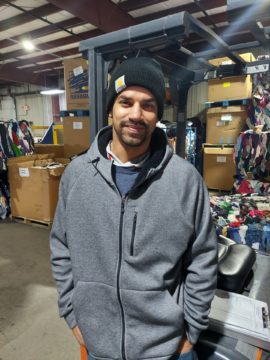
Accompaniment on a new path
Enrique’s new path of hope is made possible by your generosity and your care for him and many men working to change their lives for the better. His journey could not be realized without you – your donation of goods, volunteer support, shopping at our thrift stores, and monetary gifts.
You and the Society of St. Vincent de Paul — Madison have embraced Enrique and are accompanying him along his new path of hope.
In addition to being a model Port resident, Enrique is a St. Vincent de Paul — Madison employee who recently earned a promotion at the Processing Center. He joined the staff while serving a sentence at Oakhill Correctional Institution.
“While I was in prison, I worked my way down to the custody level to be able to get a job in the community,” Enrique said. “And that’s where I met John Cobb (Associate Director of Retail Operations) and he hired me, gave me a job at the Processing Center and this is how this all started. If John didn’t give me the chance, I know I wouldn’t be doing as well as I am doing.”
“If I didn’t get the opportunity to work I would have gone back to Milwaukee and wound up right back into the mix,” Enrique continued. “I probably would have ended up doing drugs again, coming back to prison. John put me in touch with Nick and talked to the social worker and my probation officer, they got in touch and set it all up and here I am.”
What started was a transition from incarceration to full-time employment and support to plan his next steps in life while living at Port St. Vincent de Paul. Enrique is now working towards building a new life with your help and continued support.
The people who help
Enrique credits the personal connections he has made through St. Vincent de Paul with helping him be successful.
“Nick has been amazing,” Enrique said. “He is probably one of the nicest people I’ve met in my life. It doesn’t matter what you did, or where you’re from. He doesn’t look at you any differently. He’s just got a huge heart. He’s a great guy.”
Nick applauds Enrique’s work to change his life and commends him as an example of the immense power and potential of Port St. Vincent de Paul.
“He is setting an example for other Port residents,” Nick said. “The way he’s living and taking care of his business is setting an example.”
The generosity of others
Port residents receive counseling, daily meals, laundry facilities, and access to phones and computers through the program. Residents pay nominal program fees to partially underwrite expenses and establish a payment history for tenancy when they move into permanent housing. Staff work with residents to identify and achieve their goals which leads to greater stability and independence such as references for permanent housing and employment.
Nick is moved by the generosity of people like you who volunteer and donate money to support men changing their lives through the men’s housing program.
“I already have calls from people that are planning to bring loads of wrapped Christmas gifts,” Nick said. “It almost makes me want to tear up. The fact that people do care in this community.”
Overcoming challenges and moving forward
Enrique has his sights set on a brighter future.
“I hope to get my own place and continue starting my life over,” Enrique said. “It’s crappy having to restart all of the time. I just turned 34 and I’m still climbing out of holes.”
When asked if he had advice for other men in similar situations, Enrique said he would tell them to reach out for help.
“I would tell them that if they’re in need and they’re struggling like I was, they should try this route,” Enrique said. “I would tell them about Nick.”
If you have a heart for creating futures of hope for Enrique and men like him, please pray for them and Director Nick Fatsis, and give generously to support the life-changing work at Port St. Vincent de Paul.
It’s a bright sunny afternoon in late October as Kamaria* finishes her work day as a caregiver. She smiles, says hello when I walk up to her car to chat. Yesterday included two shifts, one for each of her employers, 12 hours in total. She is tired.
“Caregiving is a hard job,” Kamaria says. “But it’s good. If people didn’t like it, they wouldn’t do it.”
Kamaria’s third job is being a mom to three teenagers. Her youngest is 14.
“I am so busy, they keep me on the run,” Kamaria says.
Her final stop before going home is the St. Vincent de Paul Food Pantry.
“I have been coming to the pantry for a long time,” Kamaria explains. “It helps, it really helps. Especially now with how expensive food is.”
Increased need for food
As pantry staff member Ashleigh loads Kamaria’s groceries into her front seat, she smiles and laughs that her kids can help her unload once she gets home. The boxes and bags are heavy with fresh produce and pantry staples. Cooking oil and other baking items are particularly bulky and hard to afford on her budget.
“The kids eat all of the food, they can unload it,” Kamaria laughs. “I cook healthy food all of the time. My kids love fruits and vegetables. Anything fresh.”
The rising prices of food, gas and utilities are hurting her ability to care for her children. She gets food from the pantry to be able to afford other bills.
The St. Vincent de Paul Food Pantry is open four days a week to provide groceries to families and individuals. Each month since May of this year an increasing average number of households have turned to the pantry for help with food. Rising costs hit people with limited incomes the hardest forcing them to make hard choices and adding stress to their lives.
A blessing of time and convenience
Kamaria struggles to find time to balance all of the demands of her day: working two jobs, managing a household and raising three hungry teenagers. She uses Pantry2Home (formally PantryPal), the online food ordering system. She credits the resource as a game-changer for her family.
“The online order has been good. I come home from work and don’t have time to wait in line and have to go right home and cook,” Kamaria says. “A friend from work told me about this service. I am so glad I learned about this.”
Placing an online order relieves the burden of time from families stretched thin, allows them to choose exactly which pantry items they need, reduces food waste and offers greater flexibility for cultural preferences and dietary restrictions. Online orders are easy to make for people using the pantry. They visit the Food Pantry page of our website and click the Pantry2Home button to place an order for pickup, or the DoorDash button to place an order for delivery.
Currently, about 20 families place and pick up orders each Monday, Tuesday and Friday. On Thursday, that number exceeds 50 families as DoorDash drivers deliver the orders to 25- 40 families, in addition to those who choose to pick up their orders. Pantry staff and volunteers work hard to pack all of these orders while still managing the drive-through pantry service. Your generosity fed an average of 145 households each pantry day last month.
“You guys do wonderful things. I don’t like to waste food and with the online ordering I can choose exactly what I know my kids will eat,” Kamaria reaffirms.
Kamaria relies on the St. Vincent de Paul Food Pantry to feed her family and give her hope. Your care for and generosity to her and thousands of neighbors like her is tremendous. You make moving forward together in hope possible.
*Name changed to maintain the neighbor’s privacy. Photos are representational.




